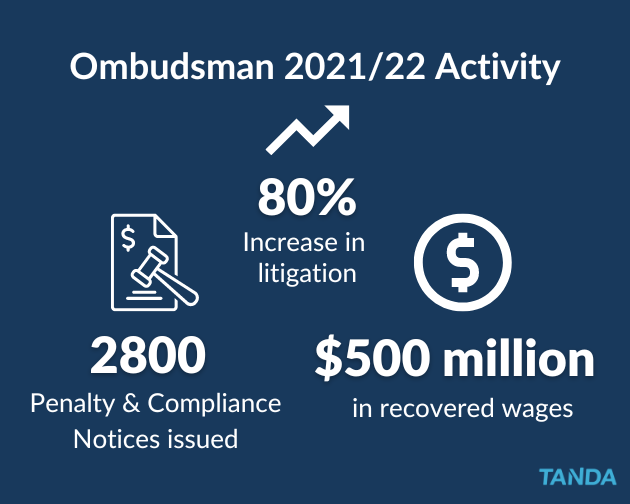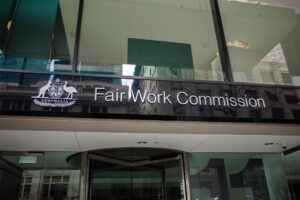The recent release of the Fair Work Ombudsman’s Annual Report has underlined the Regulator’s strong pursuit of workplace compliance in Australian businesses nationwide. Last year, Tanda wrote about the Ombudsman’s plans to ramp up compliance action in specific sectors and geographic locations, as well as in certain areas of workplace law.
The release of the Annual Report shows exactly what Fair Work has been up to, as well as its plans for the year ahead. Tanda has broken down the 164 page document and identified key trends that every Australian business should be aware of.
Continued Focus on Compliance & Audits
The annual report shows that the Fair Work Ombudsman wasn’t bluffing it said it was going to ramp up audits in 2022, hitting the vast majority of its targets. This year alone, the Ombudsman handed out more than 2,300 compliance notices, almost 500 penalty infringement notices, and filed more than 137 litigations. As can be seen in the graphic below, with the exception of enforceable undertakings, all of these were well above the Regulator’s targets set last year.

The Fair Work Ombudsman’s strategy can be split into how it targets large corporations versus how it targets small and medium enterprises. Typically, litigation, enforceable undertakings, and self-disclosed underpayments come from corporate enterprises.
By contrast, the vast majority of penalty infringements and compliance notices are directed at small businesses. While the Ombudsman recovered more money from large corporations, it still recovered a sizeable sum from small businesses, and spent a large amount of resources doing so.
Small and Medium Enterprises (SME)
Most action against SME’s comes in the form of surprise audits from Fair Work Inspectors representing the Fair Work Ombudsman. Typically, Inspectors will demand to see payroll records and issue an Infringement Notice or a Compliance Notice if they find wrongdoing.
An Infringement Notice is a simple fine issued to employers for breaching record-keeping and pay slip requirements. Records are required to be kept on hand for seven years. Many Inspectors will immediately look for poor record-keeping when they visit a business, because it’s the easiest way to give a fine.
A Compliance Notice is slightly different, and is issued when there is a reasonable belief that workplace law has been breached. Compliance Notices will almost always force businesses to back pay wages. They are the primary enforcement tool relating to underpayment matters.
The key point is that the Fair Work Ombudsman has handed out more Compliance and Infringement Notices this year, because it has massively ramped up surprise audits and its deployment of Inspectors.
Corporate Enterprises
Enterprise organisations face a different type of scrutiny on compliance matters. The Fair Work Ombudsman has created a dedicated large corporate branch to support its investigations into large enterprise. This investigations unit will often dive right down into the minutia of large organisations’ workplace arrangements.
Fair Work recovered $279 million from 267,000 employees in the Corporate Sector last year. Interestingly, 68% of the money was self-disclosed, as businesses take a rigorous approach to compliance and avert payroll malpractice.
Its been highly successful in finding issues in a number of businesses payroll arrangements. The fact that these businesses have had sophisticated human resources teams and still fallen afoul of the law highlights the complexity of compliance in Australia.
This has resulted in record Fair Work action, with 137 litigations filed in the last financial year, 80% more than in 2019–20. Marking a record high number, this is also the first time they’ve surpassed 100 in a single financial year.
Looking Forward: Fair Work Ombudsman Priority Targets
Fair Work’s strategy of rigorous scrutiny is set to continue. The Federal Government has recently announced that it will provide the Fair Work Ombudsman further funding and resources to increase its pursuit of businesses this financial year.
With this support, the Ombudsman will be focussing on their priority list of industries and compliance areas, including:
- Fast Food, Restaurants and Cafes
- Agriculture
- Sham contracting
- Large corporate and University sectors
- Contract cleaning
If this list looks familiar, that’s because it’s very similar to the previous financial year, with the addition of the University sector. Fair Work has selected these industries based off the following criteria:
- Impact on vulnerable workers
- Significant public interest or scale
- Blatant disregard for the law
- Action that sets a precedent or provides clarity around the law
The individual compliance strategies will naturally vary across each industry.For example, the Fair Work Ombudsman will often target geographic locations for fast food businesses, restaurants and cafes – sending an Inspector to a food precinct and surprise auditing every business in the area. Often, this will be based on a tip-off or complaint. This is naturally very different from corporate enforcement.
Within these priority areas, Fair Work has found several consistent issues which it’stargeting:
- Inadequate annualised salary arrangements that fail to compensate employees for minimum entitlements
- Failures to implement enterprise agreement obligations or undertakings
- Failures to address known issues before comprehensive organisational reviews are undertaken
- Ineffective governance (sometimes complacency)
- A lack of investment in payroll systems,record-keeping systems, expertise and auditing.
Naturally, these issues vary across organisational size and industry. If you’re interested in taking a deeper dive into these issues, Tanda’s Head of Product Compliance Andrew Stirling has taken a detailed look in a recent episode of our PaySure Webinar.
Staying Compliant
There is no one-size-fits-all way to stay compliant with Australian Workplace Law. Tanda believes taking a rigorous approach towards payroll issues and leaving no stone unturned is the best way to detect systemic issues and stay on the right side of the law, whether your business is an ASX-listed enterprise or a sole trader.
With this in mind, there are still some basic compliance actions that every business can take. As we mentioned, one of the continuous issues the Fair Work Ombudsman has found is a failure to invest in payroll systems, including record-keeping systems, expertise and auditing. At a minimum, an electronic time and attendance system is key to producing extensive digital records that the Ombudsman can easily verify, and should be key for almost every Australian business.
Likewise, quality expertise and self-auditing is a top priority for corporate enterprises. However, many small businesses often don’t have the resources to invest in payroll departments or human resources. Tanda recommends that these businesses familiarise themselves with their award’s requirements and common issues that arise, like annualised salaries.
In all, the Fair Work Ombudsman will continue its pursuit of non-compliant businesses this financial year. Businesses need to be aware of the vast array of resources at the Ombudsman’s proposal, be they big or small, and take a rigorous attitude towards staying compliant.






